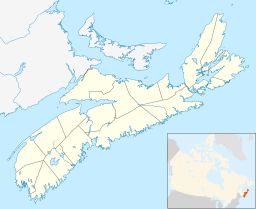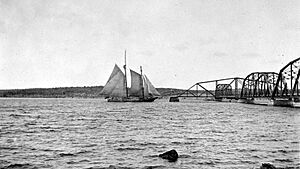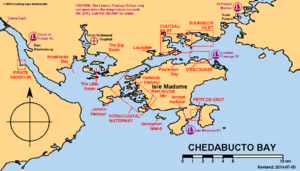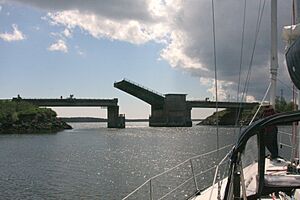Lennox Passage (waterway) facts for kids
Quick facts for kids Lennox Passage |
|
|---|---|
| Location | Cape Breton Island, Nova Scotia |
| Coordinates | 45°34′54″N 61°05′12″W / 45.58167°N 61.08667°W |
| Type | Strait |
| Part of | Atlantic ocean |
| Max. length | 10 nautical miles (19 km) |
The Lennox Passage is a natural waterway in Nova Scotia, Canada. It flows between Cape Breton Island and Isle Madame. This passage is like a shortcut for small boats.
Boats use this protected waterway to travel between the St. Peters Canal and the Strait of Canso. It helps them avoid the rough, open waters of the Atlantic Ocean.
The passage is about 10 nautical miles (19 km) long. Its depth changes from 3 to 20 metres. Special buoys help guide boats safely through the water.
Contents
Connecting the Islands: Bridges Over Lennox Passage
For a long time, people crossed Lennox Passage using ferries. Two ferries helped connect Isle Madame to Cape Breton.
The First Bridge
In 1916, work began on the first bridge across the passage. It was a swing bridge and was finished in 1919. This bridge connected Isle Madame to Cape Breton. Interestingly, a horse named Stanley Forgeron's horse helped operate this bridge in 1967!
The Oil Spill and New Bridge
In February 1970, a large oil spill happened nearby. A tanker called the Arrow spilled over 2 million gallons of oil into Chedabucto Bay. To stop the oil from spreading into important fishing areas, two causeways were built.
After the cleanup, one causeway stayed in place. The old 1919 bridge was too rusty to use. So, a new bridge was built. This modern bridge is a bascule bridge, which means it can lift up. It is 98.5 metres (323 ft) long and carries Nova Scotia Route 320.
When the bridge is closed, boats can pass underneath if they are shorter than 5.5 metres (18 ft) at high tide.
Bridge Challenges and Repairs
Since 2010, the Lennox Passage Bridge has had some issues. Sometimes, in hot summer weather, the bridge could not lift. This meant boats had to wait or take a much longer route around Isle Madame.
Ongoing Repairs
The Nova Scotia Government planned repairs for the bridge starting in 2015–2016. However, by 2018, the repairs were still not done. It was announced that the bridge was not working properly. Boats taller than 5.5 metres (18 ft) at high tide could not pass.
In late 2018, a company was hired to fix the bridge. The cost was about $4.54 million. In 2019, a warning was issued that the space under the bridge was even lower. It was only 3.3 metres (10 feet) at high tide until September 2019.
Officials explained that the work was taking longer than expected. They hoped the bridge would be fully open by mid-to-late October 2019. Finally, in September 2019, it was announced that the bridge would be open for the 2020 boating season.
 | Sharif Bey |
 | Hale Woodruff |
 | Richmond Barthé |
 | Purvis Young |





